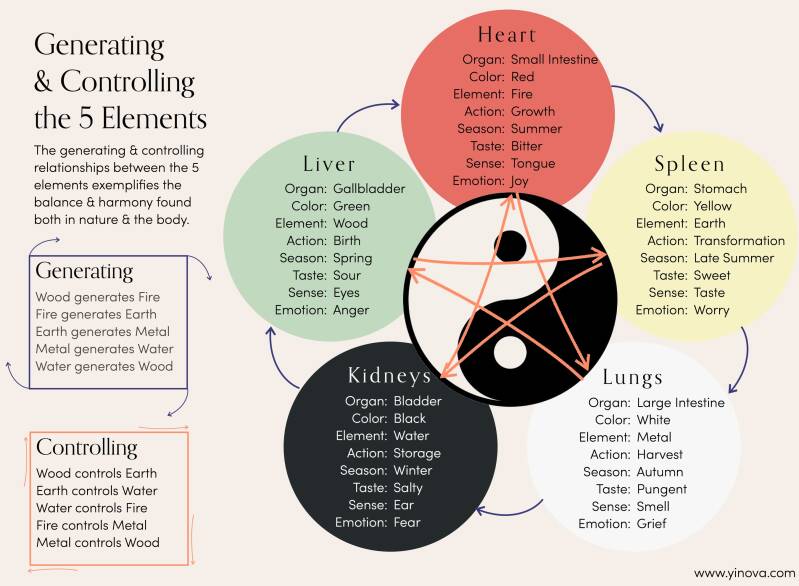
Understanding the Five Elements in Equine Health: A Holistic Approach
Traditional Chinese Medicine (TCM) is a comprehensive system that extends its principles beyond human health to include veterinary care. One of the core frameworks within TCM is the Five Elements Theory, which categorizes various aspects of physiology and pathology into five interrelated elements: Wood, Fire, Earth, Metal, and Water. Each element is associated with specific organs, emotions, seasons, and behaviors. Applying the Five Elements Theory to horses provides a holistic approach to understanding and managing their health and well-being and is one of the steps in our detailed clinical examination of your horse. Each element has a taste association too which is utlised in food and herbal therapy ,all of which can be combined as part of a treatment protocol and to enhance acupuncture treatments.
Read on and see if you can see or link any of the five elements with your horse and let us know in the comments.
The Five Elements and Their Associations
1. Wood Element
- Organs: Liver and Gallbladder
- Emotion: Anger and Frustration
- Season: Spring
- Taste : Sour
- Behavioral Traits: Wood horses are often characterized by their strong-willed, competitive, and energetic nature. They may be prone to impatience and frustration, particularly if their energy is not adequately channeled.
Health Considerations:
- Musculoskeletal Issues: Wood horses are susceptible to tendon and ligament injuries due to their active nature.
- Liver Health: Maintaining liver function is crucial, as it regulates the flow of energy (qi) and blood. Detoxifying herbs and appropriate diet can support liver health.
2. Fire Element
- Organs: Heart and Small Intestine
- Emotion: Joy and Excitement
- Season: Summer
- Taste : Bitter
- Behavioral Traits: Fire horses are known for their enthusiasm, sociability, and spirited behavior. They thrive in stimulating environments but may become anxious or overly excitable.
Health Considerations:
- Cardiovascular Health: Supporting heart function is essential for Fire horses. Regular exercise and a calm, balanced environment can help manage their high energy levels.
- Anxiety Management: Techniques such as acupuncture and herbal remedies can help in calming anxious Fire horses.
3. Earth Element
- Organs: Spleen and Stomach
- Emotion: Worry and Pensiveness
- Season: Late Summer
- Taste : Sweet
- Behavioral Traits: Earth horses are typically dependable, nurturing, and calm. They may display signs of worry or overthinking, especially if their routine is disrupted.
Health Considerations:
- Digestive Health: Earth horses often have sensitive digestive systems. A stable diet with high-quality forage and probiotics can support digestive health.
- Weight Management: Ensuring they maintain a healthy weight through balanced nutrition and regular exercise is important to prevent obesity-related issues.
4. Metal Element
- Organs: Lung and Large Intestine
- Emotion: Grief and Sadness
- Season: Autumn
- Taste : Spicy
- Behavioral Traits: Metal horses are disciplined, organized, and often exhibit a strong work ethic. They may be more reserved and prone to sadness or respiratory issues.
Health Considerations:
- Respiratory Health: Metal horses are prone to respiratory ailments. Keeping their environment dust-free and providing respiratory support through herbs can be beneficial.
- Skin and Coat Care: Maintaining the health of their skin and coat is important, especially in dry or dusty conditions.
5. Water Element
- Organs: Kidney and Bladder
- Emotion: Fear
- Season: Winter
- Taste : Salty
- Behavioral Traits: Water horses are introspective, intelligent, and adaptable. They can be prone to fear and may exhibit signs of stress or anxiety in unfamiliar situations.
Health Considerations:
- Kidney Health: Supporting kidney function is crucial, particularly in older horses. Adequate hydration and herbal supplements can help.
- Joint and Bone Health: Water horses may be prone to joint and bone issues. Regular veterinary check-ups and appropriate supplements can support their musculoskeletal health.
Integrating the Five Elements in Equine Care
Holistic Management:
- Balanced Diet: Tailoring the diet according to the specific needs of each element can enhance overall health.
- Environmental Considerations: Creating a stable environment that aligns with the horse's elemental type can reduce stress and promote well-being.
- Regular Exercise: Exercise routines should be designed to match the energy and temperament of the horse, ensuring they remain physically and mentally stimulated.
Preventive Care:
- Seasonal Adjustments: Adjusting care routines according to the seasons can help in preventing seasonal ailments.
- Emotional Well-being: Addressing the emotional needs of each elemental type through companionship, environmental enrichment, and stress management techniques is vital.
The Five Elements Theory can offer a profound insight into equine health, emphasizing the interconnectedness of physical, emotional, and environmental factors. By understanding and applying these principles as horse owners and veterinarians we can adopt a holistic approach to care that promotes balance, health, and harmony in our equine companions. This comprehensive strategy not only addresses existing health issues but also enhances the overall quality of life for horses, and assists us in ensuring they thrive.
Suggested reading - The Body Clock in Traditional Chinese Medicine: Understanding Our Energy Cycles for Health and by Lothar Ursinus (Author)
Image from www.yinnova.com
Add comment
Comments